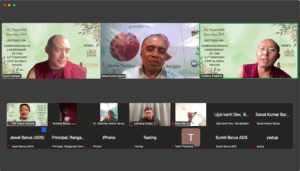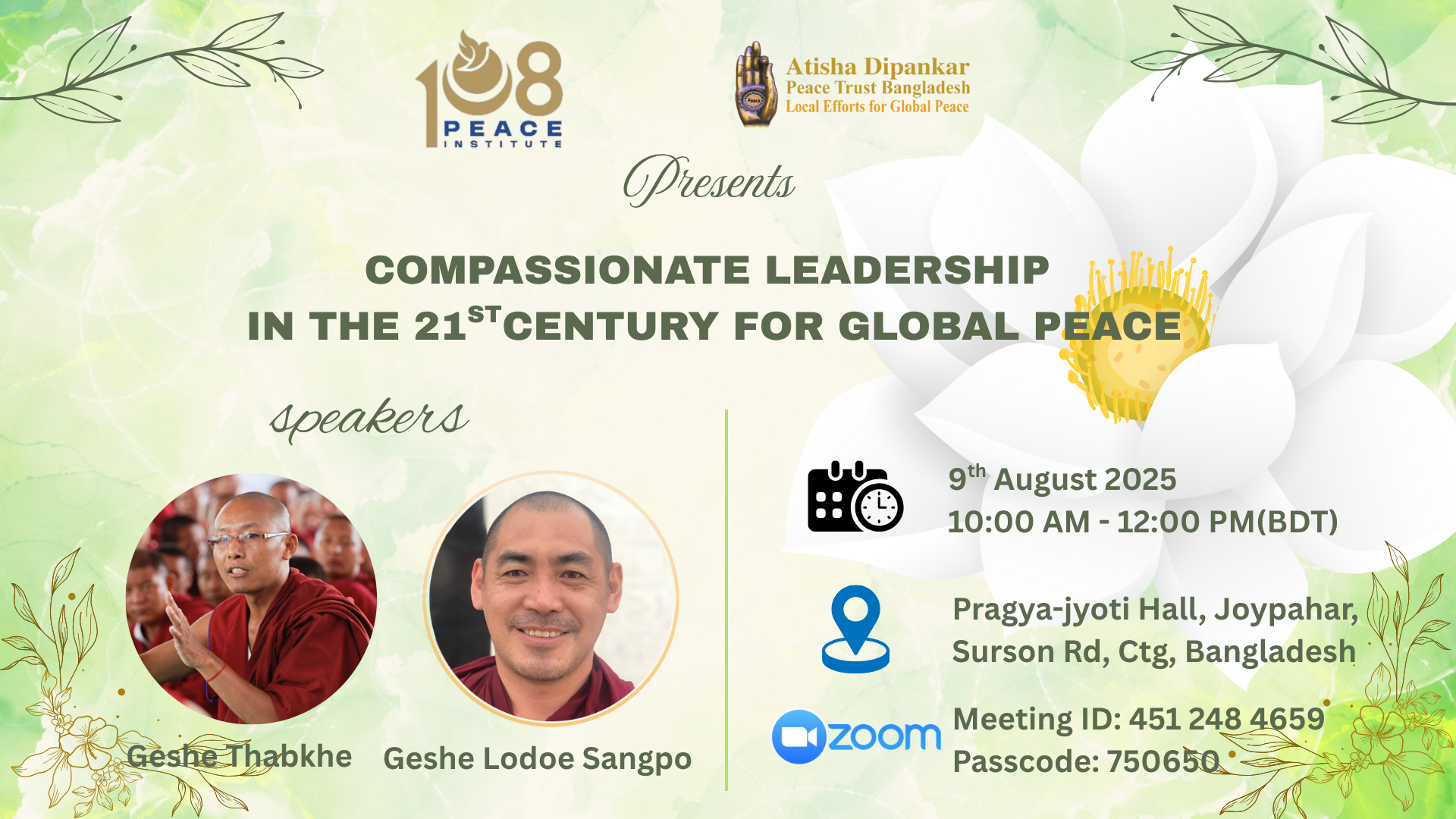On 9th August 2025, the 108 Peace Institute, in collaboration with the Atisha Dipankar Peace Trust Bangladesh, successfully hosted a virtual lecture on “Compassionate Leadership in the 21st Century for World Peace.” This session was part of the Institute’s ongoing effort to promote ethical leadership through education and dialogue.
The event brought together over 50 participants from Bangladesh and featured two distinguished guest speakers — Geshe Lodoe Sangpo la and Geshe Thabkhe la, renowned educators from the esteemed Gaden Jangtse Monastery and Sera Jey Monastery, respectively, in South India.
The session opened with welcoming remarks from the General Secretary of the Atisha Dipankar Peace Trust Bangladesh, who expressed gratitude to the 108 Peace Institute for initiating the collaboration and supporting their shared vision of building a non-violent and just society through the lecture session on compassionate leadership.
Geshe Lodoe Sangpo la began with a five-minute grounding exercise, a simple yet powerful meditation on compassion. This practice encouraged participants to recall moments of receiving love and compassion, reflect on those feelings, and imagine how spreading such positive energy could transform communities into peaceful ones.
Geshe Thabkhe la then reflected on the historical ties between Tibet and Bangladesh, highlighting the contributions of two great masters — Santarakshita and Atisha Dipankar — both believed to have originated from Bangladesh. Santarakshita, he noted, was instrumental in establishing Tibet’s first monastery, Samye, in the 8th century and in initiating the monastic tradition. Centuries later, Atisha revived Buddhism in Tibet during a period of decline. Their teachings, texts, and commentaries remain central to Tibetan monastic studies even today, said the speaker.
After recounting the significant contributions of these masters, Geshe Thabkhe la turned to the cultivation of compassion as an essential ethical value for leaders in the 21st century. Quoting His Holiness the great 14th Dalai Lama, — “Compassion and tolerance are not a sign of weakness, but a sign of strength” and “A truly compassionate leader is one who places the well-being of others before their own comfort” — he explained the deeper meaning of compassion beyond related terms such as empathy or sympathy.
According to him, compassion has three core components:
- Emotional – warm-hearted concern for others.
- Cognitive – awareness of others’ suffering.
- Motivational – the wish to alleviate that suffering.
He noted that in the West, peer-reviewed research on the science of compassion is growing, reflecting increased recognition of its positive effects on the human mind and life.
Geshe Thabkhe la extensively explained that compassionate leadership fosters trust and loyalty, transforming authority into respect. It enhances decision-making by balancing logic with empathy, strengthens resilience in the face of challenges, and promotes open communication, creating safe spaces for collaboration and innovation. He noted that the life of His Holiness the Dalai Lama exemplifies these qualities — from rebuilding Tibetan institutions in exile to receiving the Nobel Peace Prize for his unwavering advocacy of peace.
Geshe la also highlighted how His Holiness engages in interfaith dialogue and exchanges with scientists, demonstrating that compassionate leadership bridges divides and promotes shared understanding for universal peace.
Seeking the greater good, His Holiness introduced democratic governance in the Tibetan exile community, eventually transferring political power to an elected leader, said the Geshe, highlighting a rare example of a leader voluntarily stepping away from authority for the well-being of his people. Because of his compassionate leadership, he said the Tibetan community and the world have benefited from the significant contribution His Holiness has made to education, science, ethics, humanitarian work, interfaith dialogue, public teachings, and global peace.
The second speaker, Geshe Lodoe Sangpo la, spoke in greater depth about why compassion is essential. Quoting His Holiness, he said: “Love and compassion are necessities, not luxuries. Without them, humanity cannot survive.” He noted that people often become absorbed in the negativity around them, forgetting that love and compassion exist. The root cause, he explained, lies in the quality of an individual’s mind. Therefore, transforming our mental outlook should be a priority if we are truly serious about achieving peace.
He recounted a moment from the life of the Buddha. When asked, “What is the one value which, if held in the palm of your hand, contains all other values?” the Buddha replied: “Great compassion.” Drawing from this profound wisdom, Geshe la equated compassion to a magnetic energy that attracts all other virtues — a quality that today’s leaders must embody.
Addressing whether compassion can be cultivated, he affirmed that the mind can be transformed to become more compassionate through conscious effort. All humans seek happiness, and compassion can lead us toward it. He advised beginning with small, consistent acts of altruism rather than aspiring for sudden, dramatic change. These small steps, practiced daily, lead to gradual transformations that collectively contribute to a larger, positive impact.
Both speakers actively engaged with the audience, addressing questions on how to cultivate compassion and to remain resilient in the face of tragedy and chaos. The lecture session concluded with closing remarks from two distinguished guest speakers, the Operations Director of the 108 Peace Institute and Chairman of the Atisha Dipankar Peace Trust Bangladesh. They reminded the audience that we all have a responsibility to bring about change in the world, and cultivating compassion is a crucial step towards that change.

